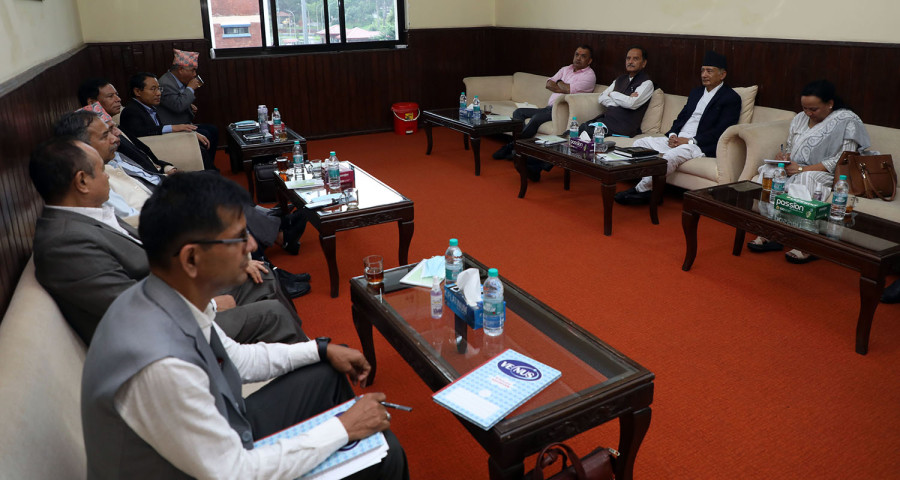Politics
Seat-sharing formula eludes ruling coalition task force
Top leaders to discuss the issue now to decide on distributing constituencies among partners.
Tika R Pradhan
The task force formed by the five-party ruling coalition has failed to finalise seat-sharing arrangements even a week after the deadline given to it ended Tuesday, with members saying a formula acceptable to all continued to elude them.
The top leadership is now expected to get into work and they have already started discussions from Tuesday.
“We have agreed to finalise seat-sharing by Thursday though,” said Manoj Bhatta, a leader of the Rastriya Janamorcha, who attended the meeting of the top leaders of the ruling coalition at Baluwatar. “Now the parties would take a political decision.”
According to Bhatta, a political decision will be taken by the top leaders of the ruling coalition and then the alliance will begin joint election campaigns from next week.
Nepali Congress leader Krishna Prasad Sitaula, the convener of the 11-member task force, was supposed to brief the top leaders on Tuesday about the modalities they had been working on but he had to leave the meeting because of his health issue, according to members.
The task force had proposed to lock the constituencies for the parties where they had won in 2017 and distribute the remaining seats won by other parties than those in the coalition among the partners. The task force was mulling distributing remaining seats under a 60:40 ratio between the Congress and four coalition constituents.
However, the Congress had not accepted the modality, saying it would limit the party to less than 80 seats of the total 165 seats under the direct election system.
Congress leader Gyanendra Bahadur Karki, a member of the task force, said
top leaders will hold one-on-one meetings to finalise seat-sharing.
“We have discussed various modalities. Now the top leaders will take a decision,” Karki told the reporters after the coalition meeting in Baluwatar. “We will settle the seat-sharing issue soon.”
Of the 165 seats under the direct election system, the Congress wants at least 90-95 seats, the CPN (Maoist Centre) 45, CPN (Unified Socialist) and Janata Samajbadi 15 to 20 seats each, and the Rastriya Janamorcha two seats.
According to Vijay Kumar Poudel, a deputy general secretary of the Unified Socialist, the top leaders had held an informal meeting to discuss seat-sharing on Tuesday morning as well but they could not come to any conclusion.
The task force led by Sitaula includes Gagan Thapa and Gyanendra Bahadur Karki from the Congress, Dev Gurung and Barshaman Pun from the CPN (Maoist Centre), Beduram Bhusal and Pramesh Hamal from the CPN (Unified Socialist), Rakam Chemjong and Ram Sahay Yadav from the Janata Samajbadi Party, and Himalal Puri and Ananda Sharma from the Rastriya Janamorcha.
The third meeting of the task force a day before the first deadline ended on August 15 had tentatively agreed on the four-point criteria—performance of each member party in the 2017 elections under the direct and proportional representation systems, their performance in May’s local elections, and priority to top leaders of the parties.
“As we failed to agree on modalities we have asked Sitaula to prepare a proposal by finding a meeting point from our discussions,” said Dev Prasad Gurung, a member of the task force.




 8.75°C Kathmandu
8.75°C Kathmandu














